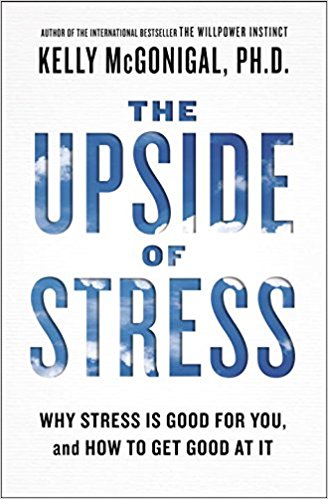The Upside of Stress Summary
5 min read ⌚

Why Stress Is Good for You, and How to Get Good At It
It’s not even noon, and you’ve already had enough with your day!
How can it be any different?
Two of your three phones are ringing, you just got an SMS on the third one, your colleague won’t stop talking about his personal problems, and nobody understands that the deadline of your project is just around the corner!
The last thing you’d want at this moment is probably someone telling you that all this stress is actually good for you!
And, yet, we’re planning to take the risk!
OK, by “we” – we’re actually thinking “Stanford psychologist Kelly McGonigal.”
And by “taking the risk,” we mean providing you with a summary of her book “The Upside of Stress.”
We mean good.
Don’t get mad at us.
Please.
Who Should Read “The Upside of Stress”? And Why?
You’re asking us who should read a book about stress in a stressed-out world?
Really?
Let us answer your question with a question: who should not?
If your response to this question – it’s rhetorical, mind you! – is “Me,” then we’re guessing you’ve either mastered mindfulness, or you’re some kind of a freak!
All the rest – students, entrepreneurs, managers, performers, office workers – may find many things pertaining to your life in “The Upside of Stress.”
Trust us.
About Kelly McGonigal
 Kelly McGonigal is an American health psychologist. Her fields of interest are generally, but not limited to, stress-coping strategies, self-compassion, and mind-body relationship. She is a lecturer at Stanford University, from where she has obtained her Ph. D.
Kelly McGonigal is an American health psychologist. Her fields of interest are generally, but not limited to, stress-coping strategies, self-compassion, and mind-body relationship. She is a lecturer at Stanford University, from where she has obtained her Ph. D.
She is the author of four books, among them the oft-quoted and translated “The Willpower Instinct.” Her 2013 TED Talk on stress has been viewed by more than 15 million people.
Read more at http://kellymcgonigal.com/
“The Upside of Stress Summary”
We know what you’re thinking:
The only upside of stress you can imagine is the feeling of relief you feel once it is gone.
But, no, McGonigal isn’t talking about anything even remotely similar! “The Upside of Stress” is a book which strives to give back stress its good name.
Yeah, right! Did it ever have one?
Well, technically, you’re right! Stress didn’t really have a good reputation, to begin with, but it didn’t have a bad one either. It had both. Since the very beginning.
We’re talking about the 1930s and a Hungarian-Canadian endocrinologist called Hans Seyle. While injecting rats with different types of hormones, he noticed that the rats’ reaction is repeatedly the same: ulcers, weakening of the thymus, swelling of the adrenal cortex, etc.
To make matters more interesting, Seyle noticed that human bodies reacted the same way after receiving certain types of news.
And here’s where it gets interesting!
Receiving good news produced similar reactions in the same organs places! Only this time, the stress was beneficial!
Many people know that Seyle invented the word “stress”. In fact, that’s probably why, no matter where you’re living, you’re using the same word to describe this type of response from your organism.
A lesser-known fact, however, is that Seyle himself differentiated between “distress” and “eustress.” Literally, you can translate them to “bad stress” and “good stress.”
So, yes, there’s such a thing as “good stress”! And it’s as old as the other kind!
The reason why you can’t fathom this is probably evolution.
You see, our ancestors lived in an environment of bears and lions. And when faced with either of them – their bodies were not merely stressed, but stressed out! The heartbeat, the adrenaline, the tight muscles – that was evolution’s way of telling them to either fight or flee.
But, there’s a big difference between a lion and a job interview!
And your brain has evolved enough to make the difference. So, it has added at least two other options in your response repository: the challenge and the tend-and-befriend response.
In the former case, your body is as focused and confident as if you’re fighting a lion – minus the fear. It’s your body’s way to tell you “the fight is on, and we have nothing to lose.” So, you can really rock the world of those around you and do things unimaginable in the mind of the regular you.
In the latter case, the oxytocin in your body makes you feel much more compassionate; it gives you both courage and the need to connect. It’s a variation of the flight response. It’s your body speaking to you “why flee? They don’t mean any harm. We have nothing to lose.”
And that’s how stress – eustress, positive stress – can make you a better person!
Who would have thought?
Stress seems to be your enemy only if you believe it is!
Key Lessons from “The Upside of Stress”
1. Stress Is Actually Good for You…
2. …and It Can Be Your Most Powerful Resource…
3. …So, Don’t Think Twice: Accept Your Stress Today
Stress Is Actually Good for You…
And you should teach your mind to make the difference and harness the hormone-induced changes in your body!
If you don’t believe us, believe science. An eight-year-long study surveying over 30,000 Americans found out that highly stressed people fearing that stress was bad for them were 43% more likely to die than any other group.
But, that’s not the whole story!
Highly stressed people who didn’t think that stress was bad for them had even lower mortality rates than those who led low-stress lives.
So, there you have it, ladies and gentlemen: reducing your stress is not as important as believing that stress is good for you.
…and It Can Be Your Most Powerful Resource…
You know those stories about mothers being able to lift a truck in order to save their children?
Well, that’s stress for you right there!
The good kind.
There’s a bad kind too, of course, but most of what you experience on a daily basis – job interviews, stage fright, tight deadlines – is not a bad stress, at all. And if you can learn how to use it, you can be not unlike the truck-lifting mothers!
Because, stress makes you feel focused and excited, confident and energized. If you believe this to be good for you, it will be: suddenly, you’ll be performing at the height of your powers!
Literally!
…So, Don’t Think Twice: Accept Your Stress Today
A quick reminder: your mind controls your brain!
Consequently, you can physically control some of the biological responses of your body.
Well, why don’t you!
Using the power of stress to your benefit is just a simple mindset intervention away from you! And it works as easy as 1-2-3!
First, learn the new point of view: “stress is good”.
Then, do an exercise which will inspire you to adapt this mindset: compare the quality of an essay written in a stress-free and in a stressful tight-deadline period. You’ll be surprised.
Finally, share the idea with others.
Just like we did here.
Like this summary? We’d Like to invite you to download our free 12 min app, for more amazing summaries and audiobooks.
“The Upside of Stress” Quotes
The latest science reveals that stress can make you smarter, stronger and more successful. Share on X Many of the negative outcomes we associate with stress may actually be the consequence of trying to avoid it. Share on X Choosing to view anxiety as excitement, energy or motivation can help you perform to your full potential. Share on X Embracing stress can make you feel more empowered in the face of challenges. Share on X We cannot always control the stress in our lives, but we can choose our relationship to it. Share on XOur Critical Review
One thing you can’t say about “The Upside of Stress” is that it’s not an innovative book. And in a world overloaded with stale ideas – that’s a first-class compliment. And we really mean it.
Because, even if McGonigal’s arguments are false, the effects of reinterpreting stress in your life seem very real. After all, placebos seem to work. Why shouldn’t this book as well?
Emir is the Head of Marketing at 12min. In his spare time, he loves to meditate and play soccer.







